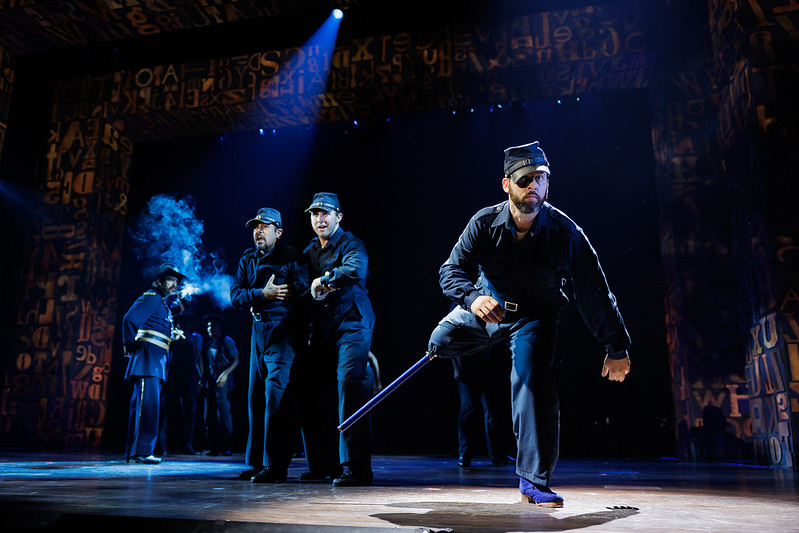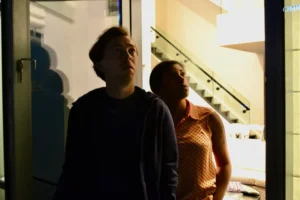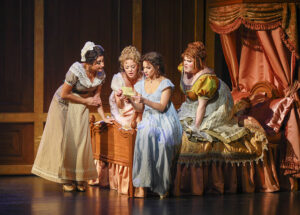The Musical Has Powerful Scenes and Strong Vocals, Although Not All of It Aligns
La Jolla Playhouse opened the world premiere of the anticipated and highly talked about 3 Summers of Lincoln. A musical piece with a book by Joe DiPietro, lyrics by Daniel J. Watts and Joe DiPietro, music by Crystal Monee Hall, and Michael Thurber as the orchestrator.
The plot starts in 1862 during the Civil War. With an opening performance pertinent to the buzz, an amputee white soldier (the majestic Evan Ruggiero) tap dances to the rhythm of a telegraph intensely lit by Amanda Zieve’s lighting, which was deep and contrasting, very Rembrandt, matching Derek McLane’s scenic design colors made up by black and brown with hints of ambers, yellows, and whites by Zieve. The frame is charged with wooden letterpress blocks/squares, hinting at Lincoln’s mastery of the printed press, and accessorized by David Bengali and Hana Kim’s projections, including handwritten letters, the American flag, and war black and white scenery. The design also includes an elevator under the stage in the middle, which is used for both imaginative and comedic moments. Although creative and fitting, the letter blocks continuously reminded me of Matilda The Musical‘s set design… it happens…go figure.
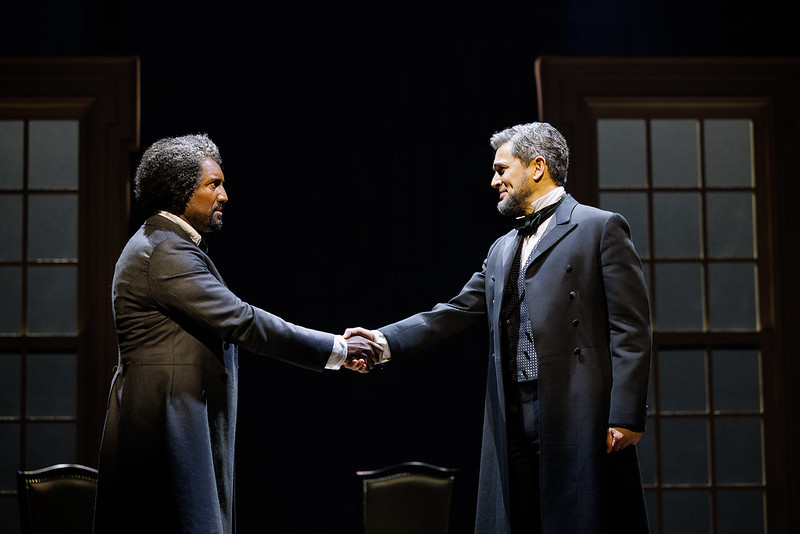
In the first act, President Abraham Lincoln (Ivan Hernandez) is a calm, Shakespeare-loving representative cornered and scolded by the members of his cabinet to then be brought to his center by his firm, intelligent wife, Mary (Carmen Cusack). As William Slade, the White House usher, and Lincoln’s confidant, John-Andrew Morrison is delightful with a spot-on performance that worked well. Carmen Cusack is a firecracker, taking every scene’s breath and running with it while putting the audience in her pocket; she is fantastic, also delivering beautiful vocals that fit into her grassroots style with songs like Mother’s Suite and In Each Letter, which she sings with the soldiers and Saycon Sengbloh as Elizabeth Hobbs Keckley. Saycon is well portrayed as Keckley performing a great rendition of the song Bring Me More.
As General George B. McClellan, Eric Anderson is charmingly sarcastic and even Trump-like at one point, which is very fitting to today’s climate, performing highly catchy songs like Sent by God and 4 Miles From Richmond, the first of which resembles The Beatles’ Come Together beat. I am not looking to compare, but we will get to that in a bit. Quentin Earl Darrington, as abolitionist and public speaker Frederick Douglass, is a standout with a mighty presence and voice from the moment he sets foot on stage with Here I Am and towards the intermission, the gospel-infused, harmony-charged That’s What He Said.
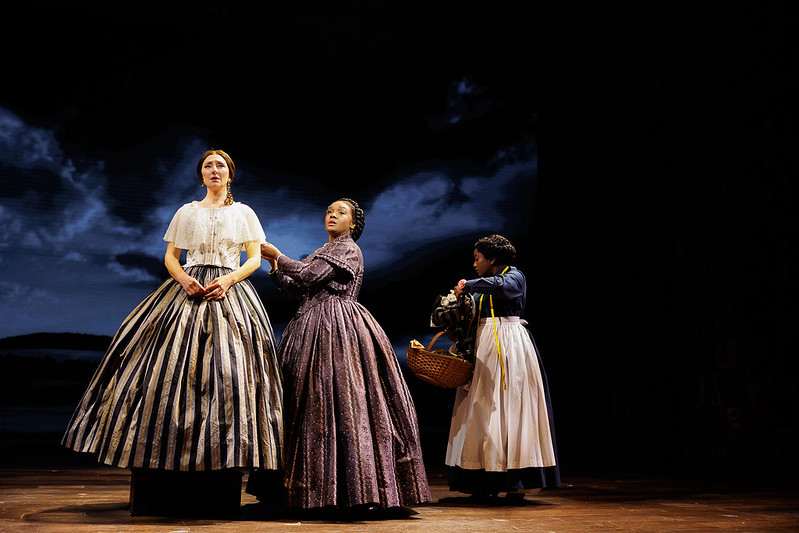
Lincoln almost felt dimmed during the first act, and this could be strategic in Christopher Ashley’s direction as in the second act, which covers 1863 and 1864, both the character and Hernandez acquire a boosted energy at par with Douglas and Darrington giving audiences a better feel of Hernandez’s training with memorable scenes and a dash of comedy. The second-act opener was a whopper with the song Pounding On The Rock, in which Jon Rua and Daniel J. Watts’s choreography excelled, combining African-influenced movements, hip-hop, and tap that was powerful. What I appreciated about the choreography was the tap combined solos and duets with Evan Ruggiero and Alaman Diadhiou, which were well woven into the story and made aesthetic sense. Toni-Leslie James’s costume design embraces the period, along with Matthew Armentrout’s wig and hair that rounded out the characters.
I am always happy to see local actors on the bigger stages, like Geno Carr, who was also in Come From Away, and Bets Malone. Magic Mosley is part of the ensemble and plays Lewis, Frederick Douglass’s son, with Naomi Tiana Rodgers as Rosetta Douglass, Frederick’s daughter. The rest of the ensemble comprises Fernell Hogan, Jana Krumholtz, Kent Overshown, Noah Rivera, Nathan Salstone, Johnathan Tanner, and. Blake Zelesnikar.
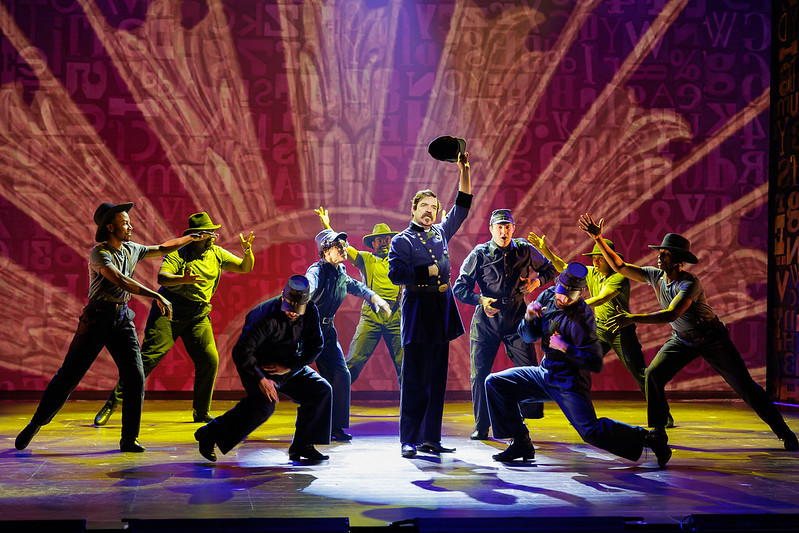
Christopher Ashley synchronizes all the moving pieces like dance, music, acting, and movement, allowing the intense scenes to have their moment and be received by the audience. I would love to say there are no references, but there are other noteworthy musicals in this realm, such as 1776 and American Prophet, Frederick Douglass In His Own Words. This musical will be compared to Hamilton because of the subject matter and the combined elements. And I also mention Hamilton because of its blockbuster status. I am not comparing yet, the references pop up. There is a brief rap in ‘Lincoln, but Crystal Monee Hall’s music is more grassroots, gospel, and harmonious. Jonathan Deans and Mike Tracey’s crisp sound design rounds out each dialogue and note with good projection. The musicians are tucked off-stage but delivered under Victoria Theodore’s music direction and Wilkie Ferguson’s music supervision. The lyrics are history/fact-packed, and they become unfitting.
There are times during the performance when there is too much of everything. Like with every new piece, there is work ahead. The musical would benefit from tightening and more dramaturgy to flow and align like the powerful scenes and songs already mentioned. Still, it’s a hot ticket that has been extended twice and is currently playing until April 6. For more information, please click HERE.
James Latus is the stage manager for this show, and Monét Thibou and Alexa Bur are the assistant stage managers.
And remember, theatre is not expensive when gifting yourself.


